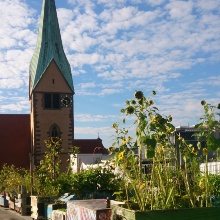In this study, we examined the relationship between urban nature exposure (i.e. gardening behavior and greenspace visit frequency) and depression risk, while also considering sociocultural background. We distributed our closed-question questionnaire to residents and pedestrians in targeted neighborhoods within Stuttgart, our model city. In total, 364 respondents of diverse sociocultural background were surveyed, of which 282 cases serve as the basis for this study. We hypothesized that (1) urban nature exposure and (2) neighborhood social interaction are associated with a lower odds of being at risk of depression, and that (3) depression risk, urban nature exposure and social interaction differ among participants according to migration history. Results indicated that being a gardener was significantly associated with a reduced odds of being at risk of depression and that having a family migration history, but not self-migration history, was associated with increased odds of being at risk of depression. In the examination of neighborhood socialization frequency and depression risk, we did not determine any significant association. The results of this study highlight the importance of considering both people’s sociocultural background and urban nature exposure in more detail to help plan for and support healthier cities in the future.
Link to the original publication: Jakstis, K., & Fischer, L. K. (2021). Urban Nature and Public Health: How Nature Exposure and Sociocultural Background Relate to Depression Risk. International Journal of Environmental Research and Public Health, 18(18), 9689.


